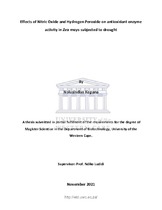Effects of nitric oxide and hydrogen peroxide on antioxidant enzyme activity in zea mays subjected to drought
Abstract
Agricultural practices are significantly affected by drought. Drought is one of the most important plant stresses, causing several physiological, morphological, biochemical, and molecular changes in plants. Drought stress is of great challenge for crop growth, development and yield. Zea mays (maize) is one of the important crops worldwide due to the nutritional profile and other uses such as human consumption, manufacturing and animal feed. Under unfavorable conditions, plants produce high amounts of reactive oxygen species (ROS). Excessive formation of ROS is harmful for plant survival and can induce cell death. Defense mechanisms activated in response to drought in plants include antioxidant enzyme activity and proline accumulation. There is evidence of the use of nitric oxide (NO) donors and hydrogen peroxide (H2O2) at low concentrations to enhance the activity of antioxidant enzymes in stressed plants. Hence, the aim of the study is to examine the role of NO and H2O2 in regulation of antioxidant enzyme activity in maize subjected to water deficit.

